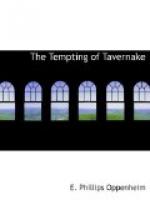She laid her hand suddenly upon his, and raising herself a little on the couch, leaned towards him. Her eyes and her lips both pleaded with him.
“Mr. Tavernake,” she said slowly, “Beatrice is such a dear, obstinate creature, but she does not quite appreciate my position. Do me a favor, please. If you have promised not to give me her address let me at least know some way or some place in which I could come across her. I am sure she will be glad afterwards, and I—I shall be very grateful.”
Tavernake felt that he was enveloped by something which he did not understand, but his lack of experience was so great that he did not even wonder at his insensibility.
“I shall keep my word to your sister,” he announced, “in the spirit as well as the letter. It is quite useless to ask me to do otherwise.”
Elizabeth was at first amazed, then angry, how angry she scarcely knew even herself. She had been a spoilt child, she had grown into a spoilt woman. Men, at least, had been ready enough to do her bidding all her life. Her beauty was of that peculiar kind, half seductive, half pathetic, wholly irresistible. And now there had come this strange, almost impossible person, against the armor of whose indifference she had spent herself in vain. Her eyes filled with tears once more as she looked at him, and Tavernake became uneasy. He glanced at the clock and again toward the door.
“I think, if you will excuse me,” he began,—
“Mr. Tavernake,” she interrupted, “you are very unkind to me, very unkind indeed.”
“I cannot help it,” he answered.
“If you knew everything,” she continued, “you would not be so obstinate. If Beatrice herself were here, if I could whisper something in her ear, she would be only too thankful that I had found her out. Beatrice has always misunderstood me, Mr. Tavernake. It is a little hard upon me, for we are both so far away from home, from our friends.”
“You can send her any message you like by me,” Tavernake declared. “If you like, I will wait while you write a letter. If you really have anything to say to her which might change her opinion, you can write it, can’t you?”
She looked down at her hands—very beautiful and well-kept hands —and sighed. This young man, with his unusual imperturbability and hateful common sense, was getting on her nerves.
“It is so hard to write things, Mr. Tavernake,” she said, “but, of course, it is something to know that if the worst happens I can send her a letter. I shall think about that for a short time. Meanwhile, there is so much about her I would love to have you tell me. She has no money, has she? How does she support herself?”
“She sings occasionally at concerts,” Tavernake replied after a moment’s pause. “I suppose there is no harm in telling you that.”
Elizabeth leaned towards him. She was very loth indeed to acknowledge defeat. Once more her voice was deliciously soft, her forehead delicately wrinkled, her blue eyes filled with alluring light.




